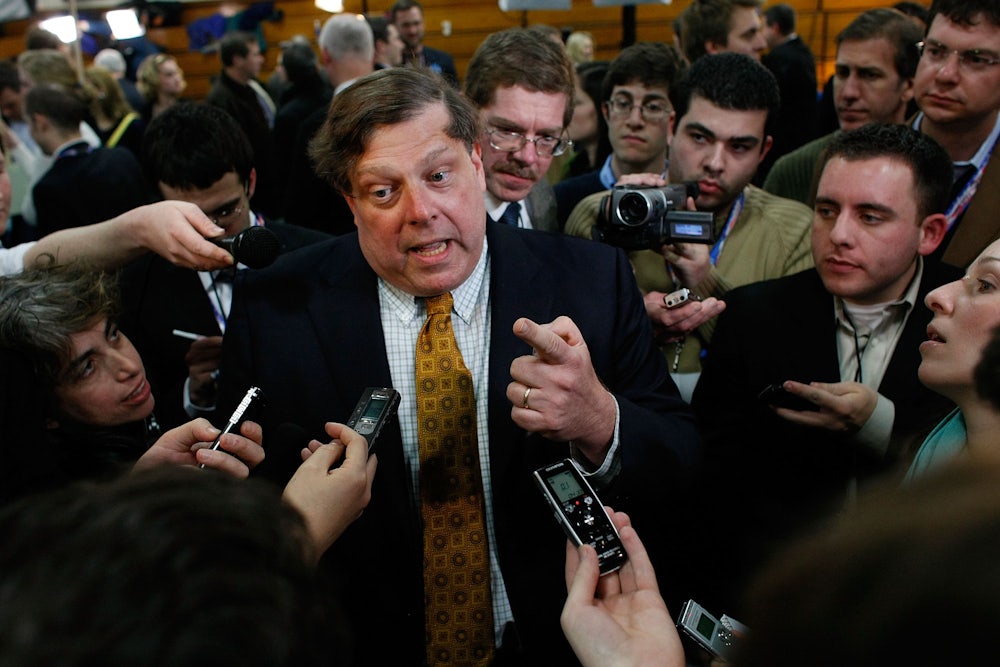In an op-ed for The New York Times, Bill Clinton’s former pollster promises Democrats the key to victory: a rightward shift. While the debate over what direction Democrats should take will rage all the way to 2020, Penn’s column is notable for its bad faith, its blatant contradictions, and its misreading of liberal politics. It feels like a dispatch from a bizarre parallel universe, where abortion and LGBT rights are not under attack, where a balanced budget is still the apex of “serious” policy thinking, and where America does not suffer from grotesque wealth inequality:
After years of leftward drift by the Democrats culminated in Republican control of the House under Speaker Newt Gingrich, President Bill Clinton moved the party back to the center in 1995 by supporting a balanced budget, welfare reform, a crime bill that called for providing 100,000 new police officers and a step-by-step approach to broadening health care. Mr. Clinton won a resounding re-election victory in 1996 and Democrats were back.
This passage neatly illustrates the dangers of thinking in politics in simple, electoral terms. Penn ignores the real-world outcome here: welfare reform resulted in an increase in deep poverty, and broken-windows policing entrenched institutionalized racism. But Bill Clinton won, so who cares? It also sidesteps the primary reason Gingrich & Co. stormed to power in 1994: Clinton’s aborted attempt to pass a universal health insurance program, which is now a mainstay of the Democratic Party platform.
Penn’s confused thinking is evident elsewhere. Take this passage:
There are plenty of good issues Democrats should be championing. They need to reject socialist ideas and adopt an agenda of renewed growth, greater protection for American workers and a return to fiscal responsibility. While the old brick-and-mortar economy is being regulated to death, the new tech-driven economy has been given a pass to flout labor laws with unregulated, low-paying gig jobs, to concentrate vast profits and to decimate retailing. Rural areas have been left without adequate broadband and with shrinking opportunities. The opioid crisis has spiraled out of control, killing tens of thousands, while pardons have been given to so-called nonviolent drug offenders.
Reject socialist ideas—but protect workers! Protect workers—but stop regulating companies to death! Expand broadband and solve the opioid crisis—but never, never forget fiscal responsibility!
Penn also addresses the party’s approach to the working class. According to Penn, Democrats alienated this group by shifting leftward on trade, immigration, and policing. There is a simple test for determining what is a serious political opinion in 2017 and what is not, and it is this: Does the writer understand that the working class is not all white? In Penn’s case the answer appears to be “no.”
Furthermore, issues like trans rights—Penn singles out the bathroom debate as a culture war flashpoint—aren’t electoral death for Democrats. In North Carolina, Roy Cooper unseated Pat McCrory due largely to McCrory’s unpopular support of the so-called “bathroom bill.”
But Penn is used to being wrong. After working for Bill Clinton, he worked for Hillary Clinton’s 2008 campaign—she lost, of course, to Barack Obama, who ran to her left at the time and is mostly absent from Penn’s version of history, despite uniting the party’s factions and winning the general election twice. (Penn concludes with an ode to “can-do Democrats in the mold of John F. Kennedy and Bill Clinton”—not Obama.) He also worked for Tony Blair, that paragon of centrist war-mongering virtue; Blair recently covered himself in glory by calling for a similar return to the center, just before Labour’s unapologetically left-wing manifesto earned it unforeseen success in the U.K.’s snap election.
It is telling—deeply, devastatingly telling—that Penn has apparently learned nothing from his decades in politics. His thoughts are stale; his politics are discredited. The Democratic Party should ignore him for its own benefit—and ours.
